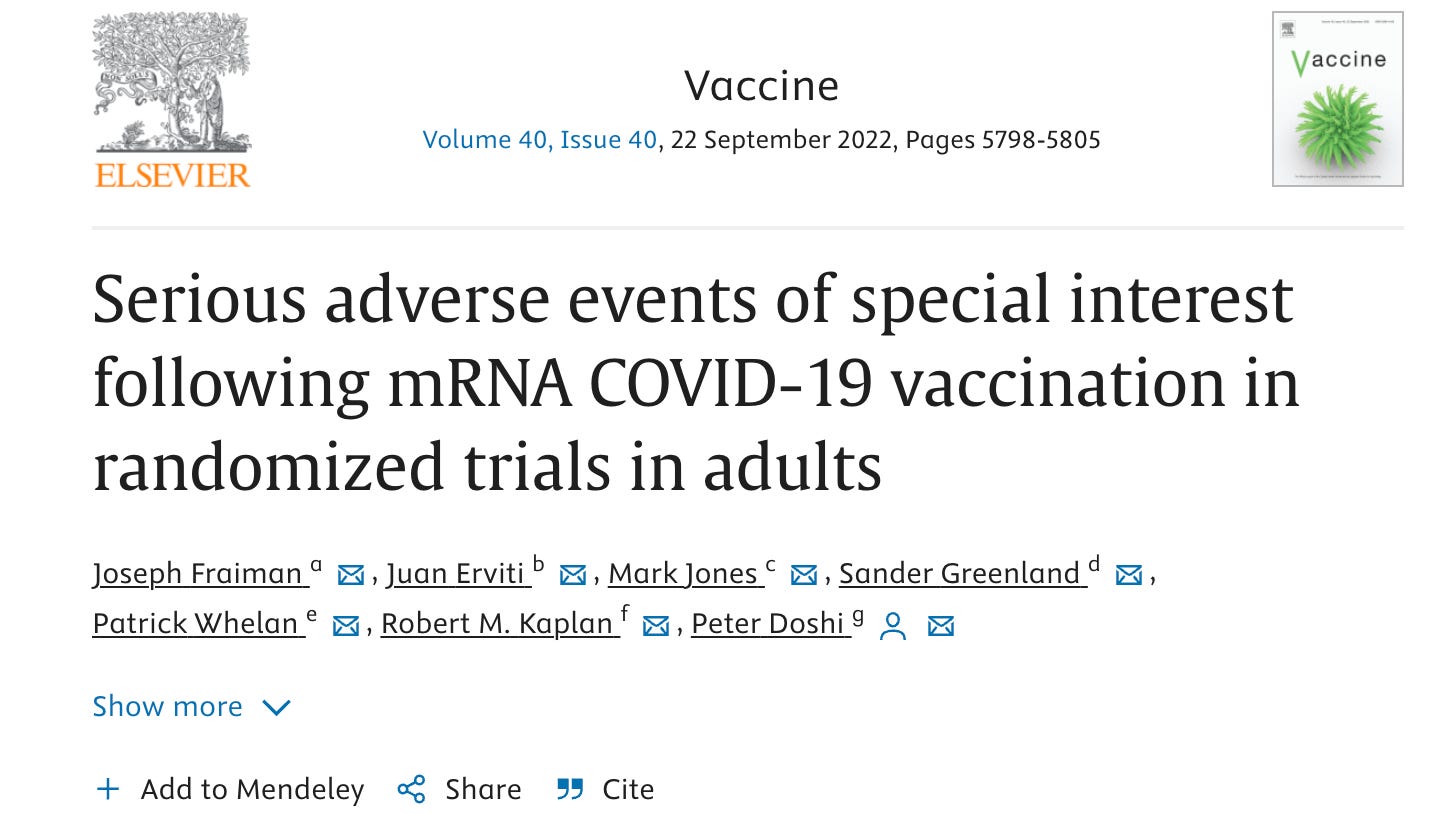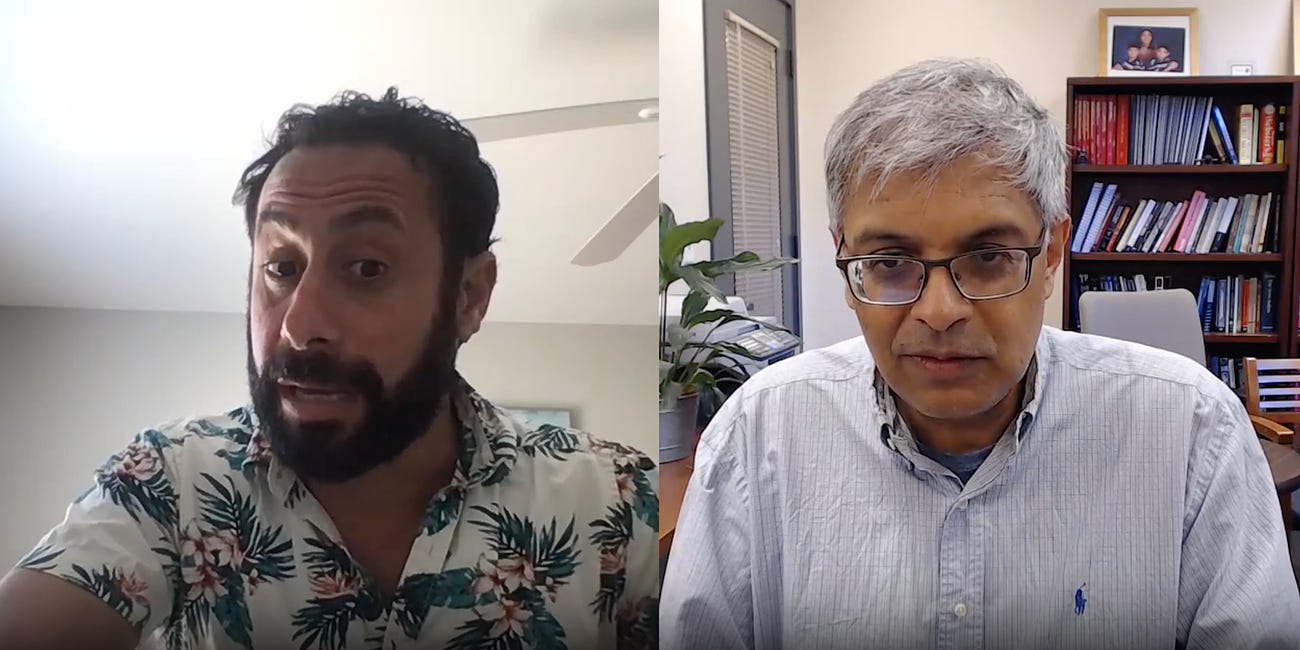Hello Illusion of Consensus readers,
Today we are excited to bring you a conversation on The Illusion of Consensus podcast between Dr. Jay Bhattacharya and ER physician Dr. Joseph Fraiman. Dr. Fraiman lead the re-analysis of Pfizer and Moderna’s safety data and discovered a 1 in 800 serious adverse event rate — far higher than any other vaccine on the market. In this podcast episode, Jay and Joe discuss his study and the implications for scientific authority and public trust — as well as Dr. Fraiman’s early experiences with Covid in the ICUs and how he changed his position over time.
Below is the full video podcast available to paid subscribers. The highlighted, lightly edited (for readability) transcript is also below. The audio version of this episode can be listened to here in the Substack app or on Spotify and Apple:
— The Illusion of Consensus Team
Highlighted podcast transcript
Dr. Jay asks Dr. Fraiman on his path towards becoming an ER physician:
So essentially it was definitely not a direct path to becoming a doctor. It was initially in college, I planned on becoming a neuroscientist and I worked in a lab and I was really good at neuroscience. I loved it actually. I was doing rat experiments. I was in psychopharmacology studies. So, but what happened in college was I was working with this graduate student who I still work with today on other projects. What we discovered, we were working with a drug, the drug ecstasy, the street drug, you know, it was MDMA.
We were looking for, for neurotoxicity. We worked for our grants were all from NIDA. And I had learned that the way the scientific system works there was if you found, if the results of our study were not what the national Institute of drug abuse wanted — that ecstasy is incredibly harmful for people — then you would sort of maybe not write that study or kind of write it in such a way that fit with the granting agency, the National Institute of Drug Abuse.
And that was just for this drug. I became very turned off by the entire scientific field when I realized that no one who isn't incredibly well-versed in this very specific literature could even know what's going on for real because the people funding it are controlling what the conversation looks like on the surface.
Dr. Fraiman on part of his essentialist, safety-first medical philosophy:
I think that the best thing for a human being is to get the least amount of medical intervention that you need. So if you give someone too much of a medicine, you always will hurt them. And I believe that in medicine, in general, when in my job, specifically in the ER, a common statement would be, let's do this just to be safe. I think when you're giving out medicines just to be safe, you're on average hurting people. When you're getting tests just to be safe, you're probably on average hurting people. You should get tests when people need tests.
Dr. Jay Bhattacharya on how Dr. Fraiman apologized to him and co-authors of the GBD because he initially fell victim to the mainstream Covid narrative:
Okay, now I'm gonna now again stop you with this for a second because I'm gonna tell the audience about how we first met so that they can have some background. We first met at a little roundtable put on by the governor of Florida, Ron DeSantis, and the roundtable was called Raising the Curtain on COVID Theater.
And the first time I learned about you, Joe, was at that roundtable where you spoke and you apologized for your initial incorrect positions. And I was at that roundtable. It was also me, Martin Kulldorf, and Sunetra Gupta, all three of us had written the Great Barrington Declaration to that question. And I was so touched by that, Joe.
Fraiman on how he initially got Covid wrong:
I wasn't a scientist when I got to my decisions based on what I was thinking then. I think I was a victim of propaganda, I think in a lot of ways, and I'm embarrassed that I was, because I would have always have expected I would have been smarter. “Propaganda can't touch me. I'm so much smarter than your propaganda.” The only place I've ever seen propaganda is in museums where they're talking about like the greatest tragedies that have ever happened in the world. And then to be like, wait, I've just been a victim of propaganda. And you're like, wait, last time I saw propaganda was these tragedies of governments that were totally manipulating their populations to do terrible things. It was a sour moment to realize.
But the initial moment where I realized … it was a friend of mine who was a school teacher. And he knew I was this hawk in my viewpoints. And he said, “It's in Louisiana and Jefferson Parish of Louisiana, they're trying to open the schools.” That's where he works. And he says, “come to the school board meeting to talk against the school's reopening.” And this must've been the summer of 2020. And I said to him, that was the moment where I realized, it was like, “Okay, I'm not so sure that we should keep schools closed, like kids aren't getting hurt by this and going to school is pretty important.” Like, this is not that, it's not like I need, you don't need like a big calculation here, like to figure this one out, like there's no real math that you need, it's just, this isn't bad for kids and school's really, really good for kids."
You don't need to be a scientist to figure this one out. So I was like, no, I can't speak. But at the same time, I didn't have the courage or whatever to say anything. I didn't speak publicly at all on that. I didn't go to the, I should have gone to that school meeting and spoke out against it and said, no, you guys open these schools. You know what's bad? Not going to school.
Dr. Fraiman describes the process of re-analyzing the original Pfizer and Moderna safety trials:
So what we did was we took the original trials, we took the FDA briefings, which is these 400 page reports, and we're looking for serious adverse events. And we're doing it for both, messenger RNA vaccines, Pfizer and also Moderna. And the goal of it was trying to essentially take a magnifying glass to the serious adverse events to get rid of the statistical noise.
We said, “we're just gonna look at these adverse events of special interest.” That was the goal. This is a list created by a group called the Brighton Collaboration that is a list endorsed by the World Health Organization. This is a very proper group and they create a list of things that are potentially caused by the vaccine. So you get rid of all the things, like if a guy got shot after he took the vaccine, we don't think it's related to the vaccine. You take it away.
So we wanted to close in on the adverse events that matter. And we looked at serious adverse events, which are to the name “serious,” it's life threatening events that get you hospitalized or cause you permanent disability. This is... essentially the definition of a serious adverse event. So you don't want one. And we look at the difference. The biggest surprise of our study was when we just counted the number of serious adverse events in both trials. Because when we counted the ones in the Pfizer trial, before we did our magnifying glass analysis, the Pfizer trial had just more serious adverse events in the vaccine group. At a rate of about 36% higher and about one in 555.
























Episode 14: Dr. Joseph Fraiman On Changing His Covid Views, Treating Patients Early in the Pandemic, and Authoring the Most Comprehensive Study on mRNA Vaccine Side Effects